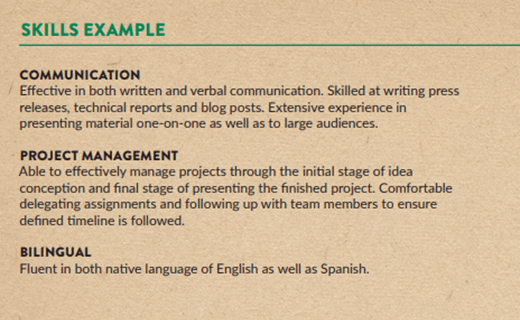- Candidates
- Login
- Set Up Account
- Create a Job Alert
- Search Tools
- Resources
- Employers

There are various recipes to follow when it comes to creating a “perfect” resume and the reality is every person looks for something different. Over the course of your professional career, you are likely to be offered resume advice that differs from person to person. No matter what an employer’s preferences may be, however, the purpose for reading your resume is the same – to see how you add value to them. Listing marketable skills on your resume will help make your value clear to whoever reads it. Knowing what skills employers want to see on your resume will set you up to be the most competitive job candidate possible.
Hard Skills– These skills are vitally important to include on a resume because they relate to your technical training, measurable abilities, and learned skills. Your hard skills show employers whether or not you can do a job effectively. If the job requires you to build/maintain a website, for example, you’d want the employer to see you have experience with Adobe Dreamweaver or Python Processing. Hard skills speak to your employability for specific jobs or industries.
More Examples
Soft Skills– In many cases, an employer will also be looking for a candidate who will mesh well with the company or a team within that company. Soft skills speak more to personality and character traits rather than teachable skills. Some examples of these are teamwork, leadership, communication, conflict resolution, active listening, andwork ethic. Oftentimes these soft skills are referred to as transferable or interpersonal skills. These skills are non-specific and show more about who you areas a person.
More Examples
Overall, keep in mind that your resume is your first opportunity to make a good impression. You may have impressive verbal communication skills that allow you to blow employers away in an interview, but your resume is the first step to getting there. Your resume has to speak for you when you can’t speak for yourself. If you resume screams – “I have no skills that wouldmake me an asset to your company” – employers are going to listen. Make sure your resume is tailored to each job you apply for. Your hard skills should be directly related to the expectations of the position and your soft skills should represent why you’d be a great employee. Don’t miss your opportunity to effectively communicate to employers why you would be a valuable addition to their company.